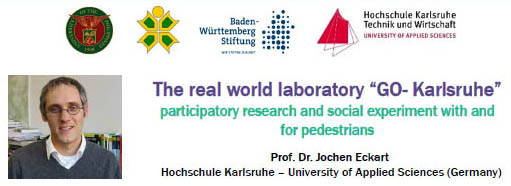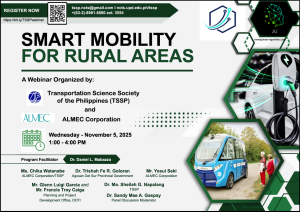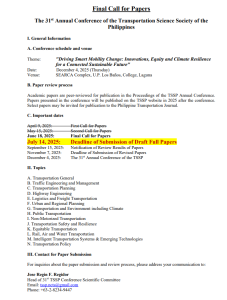
The U.P. School of Urban and Regional Planning (UP-SURP) is inviting TSSP members to a public lecture of Dr. Jochen Eckart, a visiting professor from Germany, on November 22, 2019 from 6 PM at the Carino Hall (3F) in SURP, UP Diliman.
Slots are limited so please register. Contact/registration details are in the attached announcement.
- Registration starts at 5:00 PM.
- Admission to the lecture is free. Slots are limited.
- Please reserve via: https://forms.gle/zzfPZ3fzgvJAwV3S8
For inquiries, please contact surp.graduatestudies@gmail.com or call +632 9262120.

About the Lecture:
Public Lecture at the UP School of Urban and Regional Planning (UP-SURP)
The real world laboratory “GO-Karlsruhe” – participatory research and social experiment with and for pedestrians by Prof. Dr. Jochen Eckart
Hochschule Karlsruhe – University of Applied Sciences (Germany)
Abstract: The lecture will present the research format of “real world laboratories” as well as the gained understanding of the motives of pedestrians. Walking is the most common form of movement. Walking is healthy, does not harm the environment and is important for social life in public spaces. Pedestrians are therefore an important building block for sustainable mobility in urban and rural areas. In order to increase the significance of pedestrians within the planning practice, the project “GO Karlsruhe” pursued two goals. First, the aim was to better understand the thinking and perception of pedestrians and thus develop better planning approaches for promoting the needs of pedestrians. Second, new instruments and methods for the participation of pedestrians in planning processes were developed and tested. The position of the project was to improve pedestrian traffic in the city of Karlsruhe not only for but also together with pedestrians and actors from city administration. In order to achieve this, the research format “real world laboratory” (also called social experiments, learning alliances, demand-led research) actively involved pedestrians and actors from administration in the research process. At the beginning of the project, important locations and topics to improve walking in Karlsruhe from the perspective of pedestrians were identified by means of digital participation tools as well as in face-to-face citizen participation. In so-called real world experiments, solutions to promote pedestrians were actually implemented on site in the city on a test basis and their effectiveness scientifically examined. Based on the approach of tactical urbanisim, only provisional materials were used in the experiment, which can be dismantled at short notice. This makes it possible to test novel solutions to promote pedestrians in order to offer and establish successful measures as standard solutions. As result the project generated socially robust knowledge of what pedestrians actually want and need in their everyday lives.


